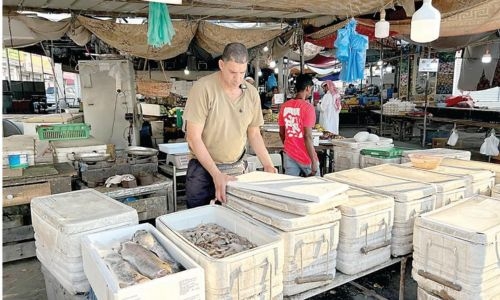Fish prices in Bahrain have recently experienced a significant drop, particularly in the safi fish category. The average price of a kilogram of safi fish has decreased to around BD3 from a peak of BD8 in August. This decline is attributed to the abundance of small safi fish in the markets, a result of the one-month fishing ban imposed by the Ministry of Municipalities Affairs and Agriculture. The ban aimed to allow the fish population to replenish, particularly the smaller safi fish. As a result, fishmongers in the Jidhafs market have confirmed that small local safi fish have become more readily available, while larger safi fish remain scarce, leading to prices ranging from BD5 to BD6 per kilogram.
Habib Jamri, the owner of Jamri Fish Workshop, emphasized that safi fish is the main driver of fish prices in Bahrain, comparing it to the US dollar. He explained that when the price of safi fish rises, all other fish prices increase as well, and vice versa. Jamri attributed the increase in smaller safi fish to the fishing ban, noting that it has led to the proliferation of very small safi fish. The ban will be extended to two months instead of one, further protecting safi fish stocks. Jamri highlighted that the lack of an effective ban last year resulted in a scarcity of small fish in the markets, but this year, thanks to the ban, there has been a significant increase in the availability of small safi fish, leading to a slight decline in prices.
He also mentioned that imported fish from Oman may experience shortages in the markets due to weather conditions or shipping delays, directly impacting safi fish prices in Bahrain. At the beginning of September, an increase in the availability of small Bahraini safi fish in the markets was observed, leading to a relative price decrease. The price of small safi fish ranged from BD2.5 to BD3.5 per kilogram, while medium-sized safi fish ranged from BD4 to BD6 per kilogram, due to improved local fishing catches. Jaafar Al Hilimi, owner of the Tashan Fish Workshop, confirmed that safi fish is available in the markets, but it is very small in size. The market heavily relies on imported fish from Oman, with most restaurants using Omani fish, some even selling it as local without disclosing the source. He emphasized that increased fishing by fishermen could lead to a balance between supply and demand, but unfortunately, customer demand for safi fish remains low.
Al Hilimi predicted a decline in fish prices with the arrival of cooler weather, as fishing activity is expected to increase. He highlighted the importance of this seasonal shift in maintaining a balance between supply and demand in the fish market. As the availability of safi fish increases and prices stabilize, consumers can expect to see more affordable options in the coming weeks. The fishing ban and the ongoing efforts to protect safi fish stocks are crucial in ensuring the sustainability of Bahrain’s fishing industry and maintaining a healthy fish population in the region. With these measures in place, Bahrain can continue to enjoy a thriving fish market with a diverse selection of seafood options at reasonable prices.










